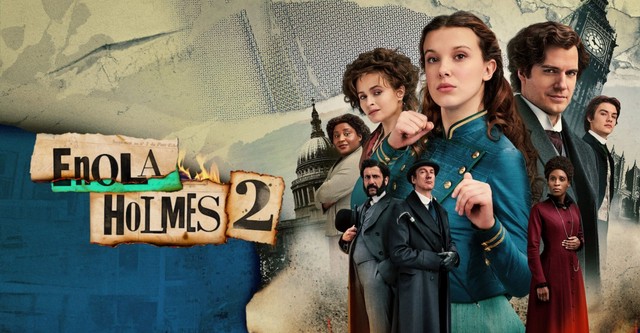Enola Holmes 2 Electric Boogaloo
When I think of “Enola Holmes 2,” I become giddy with delight. Ignoring the fact that Louis Partridge makes me feel things, the movie is a gem. As the name suggests, this is the second movie in a series, the first of which, “Enola Holmes,” ends with Enola, played by Millie Bobby Brown, claiming her identity as a detective after returning Viscount Tewkesbury, played by Louis Partridge, to his rightful role as a voting member of Parliament. The new edition of the series, “Enola Holmes 2,” came out on Netflix on Nov. 4.
The second movie begins with Enola at a loss for cases until a young girl — Bessie Chapman, played by Serrana Su-Ling Bliss — comes to Enola in need of assistance finding her sister, Sarah Chapman, played by Hanna Dodd. Together with Sherlock, played by Henry Cavill, and Tewkesbury, they begin to detangle the web of mysteries within 1885 England.
The plot intertwines romance, workers’ rights and female empowerment into a film for the ages. Although the movie is not perfect, it is enjoyable while dealing with some secretly very complex ideas, such as a woman’s ability to work in 1885, likely because it is based on the true story of the Matchgirls’ Strike of 1888 in London’s East End.
The real Matchgirls’ Strike dealt with not only health conditions leading to phossy jaw due to the use of white phosphorus, but also working conditions with low wages and terrible hours, with workers having to work up to 14 hours a day. Between the 1870s and the 1880s, matchmakers (usually girls between the ages of 14 and 20) were increasingly involved in political activism. The day after a large protest, about 10,000 matchmakers went to Parliament to demand better working conditions. Unfortunately, their attempts were for the most part fruitless.
The movie takes a slightly dramatized approach, instead of demanding direct political action, Sarah Chapman stands on a workstation and monologues, with the summarized sentiment being “this stops now.” She and Enola encourage the girls working in the factory to stand up for themselves and their rights, and the scene ends with the girls walking out of their factory.
In sum, the movie is an excellent way to spend a couple hours when one wants to blow off school work. A solid 8/10 floor stomps, one would say. The dueling scenes where Tewkesbury teaches Enola to dance and later she teaches him how to fight are adorable.



